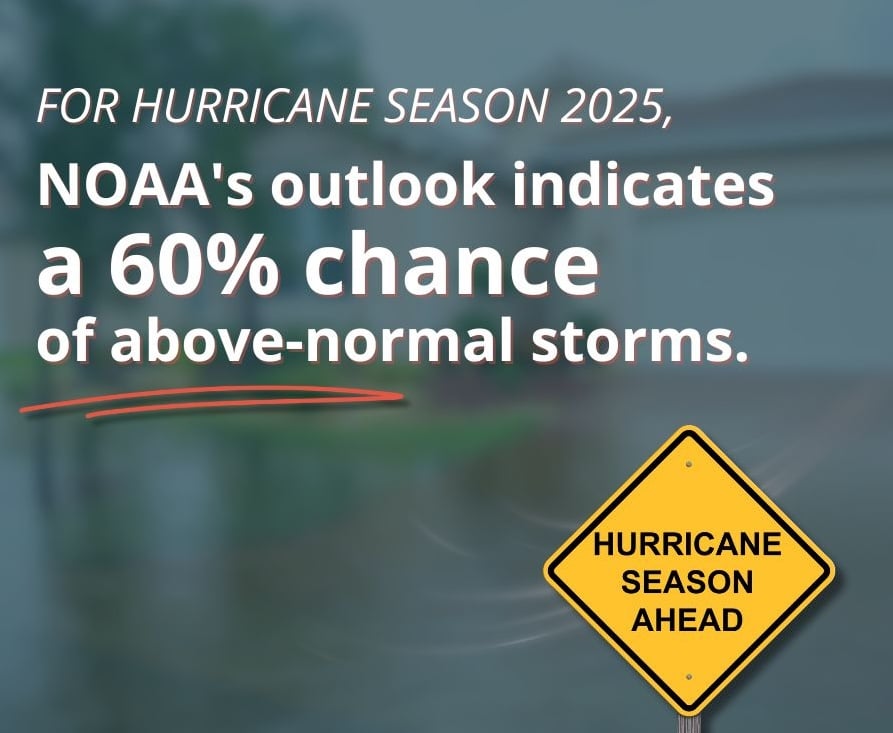If you live in Florida, you know hurricane season is part of life. But being used to it doesn’t mean you can afford to get comfortable. Every year, homes across Central Florida deal with wind damage, flooding, and unexpected repairs that could have been avoided with better preparation.
This guide walks through how to get your home ready before a storm hits, what to check after it passes, and when to bring in a professional to catch the issues you might not see right away.
Table of Contents
ToggleWhen Is Hurricane Season in Florida?
Hurricane season officially runs from June 1 through November 30, with peak storm activity usually between August and October.
Central Florida may not be coastal, but storms still bring heavy winds, flash floods, and damage to roofing, siding, and even foundations. Inland areas aren’t immune. They’re just often less prepared.
According to the National Oceanic and Atmospheric Administration (NOAA), the next hurricane season is predicted to be above average, with 13 to 20 named storms expected. That means homeowners should plan for at least one or two serious weather events in their region.

How to Prep Your Home Before a Storm
Storm prep isn’t about panic. It’s about having a solid routine. Here’s what to prioritize:
1. Secure Your Roof and Exterior
Your roof takes the biggest hit during a hurricane. Have it inspected at least once a year, and especially before peak season. Look for:
- Loose or missing shingles
- Signs of water intrusion in the attic
- Unsecured flashing or gutters
Also check:
- Siding for cracks or gaps
- Windows for worn caulking or compromised seals
If you’ve recently had roof work done, confirm it was permitted and meets wind mitigation standards. Improper repairs are a common reason for storm-related insurance claim denials.
2. Clear the Yard and Trim Trees
Flying debris causes a lot of storm damage. Remove anything that could become airborne: garden tools, patio furniture, decorations. Trim back tree limbs that hang near your roof or power lines.
Florida building codes require trimming to maintain a safe clearance around power lines and roof edges. Make it part of your summer maintenance routine.
3. Protect Windows and Doors
Install storm shutters or pre-cut plywood to cover windows. Reinforce garage doors if they’re not rated for hurricane winds. A failed garage door can cause pressure buildup that leads to major structural damage.
Shutters with product approval from the Florida Building Commission are ideal. You can also apply removable hurricane film on older windows as a temporary upgrade.
4. Check Your Drainage
Flooding is a huge risk, even if you’re not in a flood zone. Make sure gutters are cleared and the ground around your foundation slopes away from your home. Consider installing a sump pump with a battery backup in flood-prone areas.
In Central Florida, heavy rainfall can overwhelm stormwater systems fast. If your area is prone to standing water, consider adding swales or French drains to improve runoff.
5. Review Insurance and Emergency Plans
Check your policy to confirm that hurricane and flood damage are included. Take updated photos of your home’s exterior and interior. Store digital and physical copies of insurance papers, identification, and emergency contacts in a waterproof folder.
Build a hurricane supply kit that includes water, shelf-stable food, flashlights, phone chargers, cash, and important medications. Don’t wait until the storm is a day away.
What to Do Right After the Storm Passes
Once it’s safe, walk around your property. Look for:
- Missing or damaged shingles
- Cracked or bowed walls
- Water stains on ceilings or around windows
- Signs of flooding or saturated drywall
- Fallen trees or large branches near the home
Document everything with clear, timestamped photos. Even minor damage can lead to bigger issues if ignored or left unrepaired. Don’t throw away damaged items until your insurance adjuster sees them, unless safety demands it.
What a Post-Storm Inspection Can Uncover
Storms often cause problems behind the scenes. Moisture can creep into walls or attic insulation. Roof damage might not be visible from the ground. Electrical and HVAC systems can suffer from water exposure.
A licensed home inspector can:
- Identify hidden water damage or mold risks
- Check for proper attic ventilation and roof integrity
- Detect foundation cracks or soil erosion
- Test major systems for storm-related wear or safety issues
- Provide documentation that supports insurance claims
Post-storm inspections are especially important if you’re planning to file a claim. In Florida, most insurers require proof of damage within a set time frameoften 14 days. Having an inspection done right away protects your ability to be reimbursed.
Routine Maintenance That Helps Year-Round
Protecting your home from hurricanes also improves your long-term maintenance habits. Here are some proactive tasks:
- Clean gutters every few months
- Inspect your roof annually, especially before summer
- Reseal windows and exterior doors where needed
- Keep tree limbs trimmed back and remove weak branches
- Test sump pumps and backup power sources quarterly
- Check attic insulation for signs of moisture or pests
You can also set reminders to check your emergency supplies twice a year, once before hurricane season begins, and again at the end.
Conclusion
In Florida, hurricane season isn’t just a weather event. It’s a test of how well your home is prepared. A little prevention now can save you thousands later. Whether you’re getting ready for a storm or recovering from one, knowing what to look for and when to bring in an inspector can make all the difference.
If you’re unsure whether your home is truly ready, or if recent storms might have caused damage you can’t see, Tier-1 Pro Inspections offers professional, detailed evaluations you can trust.

